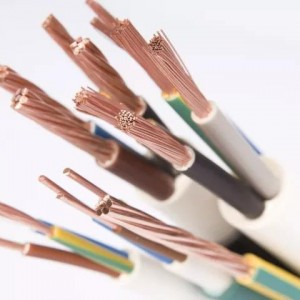Generally speaking, there is no strict boundary between ”wire” and ”cable”, and there is no precise and fixed conceptual distinction, which is usually only distinguished by daily experience. The difference between wires and cables is that wires are usually smaller in size and simpler in construction, but cables are sometimes included in a broader category of wires. In a narrow sense, it is divided into wires and cables, and in a broad sense, they are collectively referred to as cables. So what is the difference between wire and cable? Zhongwei Cable will take you to find out. In short, a wire consists of one or more flexible wires covered with a soft sheath, and a cable consists of one or more insulated wires covered with a tough metal or rubber sheath. Wire and cable generally consist of three parts: core wire, insulating sheath and protective sheath. Each conductor of a cable can be counted as a strand. This is the most direct difference between wires and cables. Of course, there are three differences.
01. Material difference
A wire is a metal wire used to conduct electricity and is used to carry electric current. They come in many forms such as solid, twisted or foil braided. According to the insulated metal, it is divided into two categories: bare wire and insulated wire. An insulated wire consisting of one or more insulated conductor cores placed in a hermetic sheath. The difference between a wire and a cable is that wires are generally smaller in size and simpler in construction, but cables are sometimes classified as generalized wires.
02. Structural difference
The difference between cables and ordinary wires is that the cables are large in size and complex in structure. Cables are mainly made of conductive cores (highly conductive materials). The insulating layer used as cable insulation should have high insulation resistance and high breakdown electric field strength. Cables are usually classified as insulating materials.
03. Use difference
Bare wires are wires that do not contain any insulation or protective layer. In addition to being used as wires for transmitting electrical energy and information, they can also be used to manufacture components and connecting wires of motors and electrical appliances. In addition, there are various insulated wires suitable for special requirements, such as low-voltage wires for automobiles, high-voltage ignition wires for automobiles, lead wires for motors, aviation wires, compensation wires, etc. According to the application, cables can be divided into power cables, communication cables and control cables. In addition to the above differences, cables have distinct advantages. Compared with the overhead line, the advantage of the cable is that the horizontal insulation distance between the lines is small, the floor space is small, the underground laying does not occupy the development space above the ground, and the transmission reliability is high. Therefore, most cables are used in densely populated, densely populated areas and crowded places, and it plays an important role in modernization. The above is the relevant content about the difference between wires and cables in this issue. Finally, Zhongwei Cable reminds everyone that when purchasing wires and cables, you must look for regular manufacturers, check the quality, and don’t buy some unqualified ones just because the price is cheap. Electric wires, to avoid accidents that cause loss of personnel and property.
Email: sales@zhongweicables.com
Mobile/Whatspp/Wechat: +86 17758694970
Post time: Apr-14-2023





